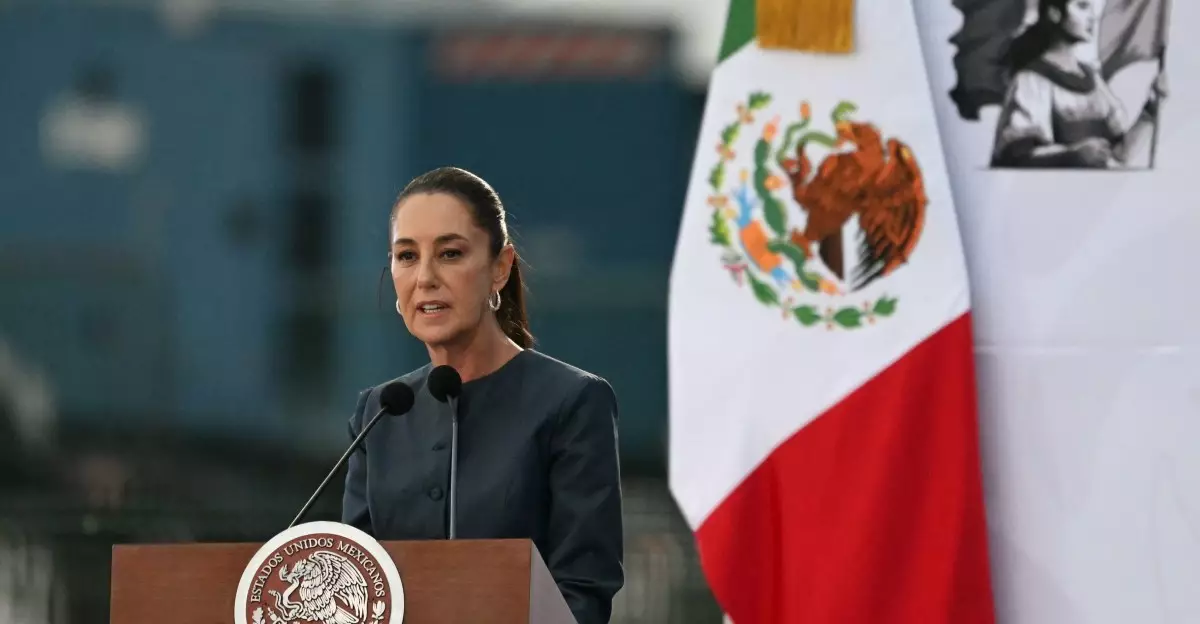In an audacious move that underscores the intersection of technology, national identity, and international law, Mexican President Claudia Sheinbaum has initiated a lawsuit against Google over the company’s renaming of the Gulf of Mexico to the “Gulf of America” for U.S. users. This decision, originally spurred by directives from the Trump administration, is a poignant example of how tech giants can influence perceptions and geopolitical narratives. Sheinbaum’s stance is not merely a dispute over nomenclature; it embodies a fierce defense of Mexico’s sovereignty in the face of U.S. hegemony.
The essence of Sheinbaum’s argument lies in the assertion that geographical identities cannot be whimsically altered by the decree of one nation, especially when such territories are shared internationally. By stating, “the only thing we want is compliance with the decree issued by the United States government,” Sheinbaum clarifies that her demand is not entirely about changing Google’s policy but about adhering to the concepts of territorial integrity and identity that she believes should be respected globally.
Google’s Role in the Global Narrative
Google’s actions provide fertile ground for debate on the responsibilities of multinational corporations. By complying with the Trump administration’s wish, Google has inadvertently taken sides in a complex diplomatic issue, one that hinges on national pride and historical significance. It raises questions about the biases embedded in the policies of tech companies and their roles as arbiters of information. The danger of allowing such companies to dictate geographical nomenclature is that it grants them a power that extends beyond profit margins into the realm of cultural and national identity.
Furthermore, the differing treatment of the Gulf’s naming on Google Maps—where U.S. users see “Gulf of America,” while Mexican users retain “Gulf of Mexico”—highlights the absurdity of an artificial distinction based purely on geography. It emphasizes how digital space can morph into a battlefield of interpretation where identities risk being overshadowed by political whims.
A Broader Implication: The Fight for Representation
Sheinbaum’s legal actions represent a broader fight for representation and recognition in international discourse. The act of renaming geographical features is not merely about semantics; it displays an effort to assert dominance and reshape reality through language. Many countries have faced similar struggles, from indigenous populations to nations striving for autonomy against overwhelming powers. Mexico’s fight is emblematic of a larger global trend where nations seek to reclaim their narratives and resist imperialistic ideologies.
To counteract the influence of political and corporate interests, nations must remain vigilant. When governments like Sheinbaum’s stand up against rebranding that erases cultural history, they spark dialogue about colonial legacies and the importance of historical fidelity. By calling attention to this issue, Sheinbaum champions not only Mexican identity but also the broader need to challenge contemporary forms of cultural imperialism that can manifest in the digital arena.
The Potential Impact on U.S.-Mexico Relations
This conflict has the potential to reshape not just perceptions of geography, but the wider relationship between the U.S. and Mexico. As these two neighboring countries navigate an already complex web of trade, immigration, and diplomacy, the Gulf naming controversy reveals underlying tensions exacerbated by political narratives. It serves as a reminder that the impacts of policy decisions stretch far beyond their immediate context.
As the lawsuit progresses, all eyes will be on the implications for both sides. For Mexico, this may be an opportunity to assert its sovereignty and reinforce its position in diplomatic negotiations. The stakes are higher than simply a name; it involves the integrity and dignity of a nation that brims with cultural heritage.
Sheinbaum’s bold stance invites a reconsideration of how nations perceive their territories and identities in an age increasingly influenced by technology. As corporations like Google tread the line of commercial interests and socio-political narratives, their decisions resonate through the fabric of international relations and national pride, setting a precedent for the role of tech giants in global identity politics.


Leave a Reply